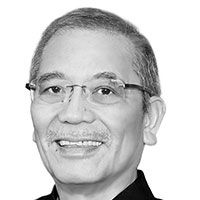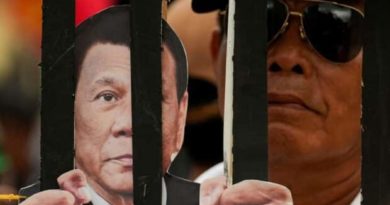OP-ED COLUMN: BREAKTHROUGH – ‘ASEAN problem: Need for consensus’ By Elfren S. Cruz
BEACH ‘RIOT’ Mock protesters scuffle with anti-riot police during a security drill in Boracay. Police with assault rifles patrolled entry points to Boracay island hours before a six-month shutdown and clean-up of the Island. AFP PHOTO
.
.
BREAKTHROUGH By Elfren S. Cruz

The temporary closure of Boracay attracted more coverage from the global media than the 2018 ASEAN summit meeting in Singapore which is scheduled to start today. Perhaps, by the end of this three-day conference of the ASEAN, we may all be surprised by some unexpected major decision or statement. But, I seriously doubt it.
I am beginning to share the view that the ASEAN is becoming less relevant in the fast changing global geopolitical landscape. The biggest obstacle is the fact that the members of the organization have not been able to arrive at any major decision even when the issue affects the South Asian region.
Its biggest problem is that ASEAN rules require decisions which can be made only by consensus. This means that in this ten-nation organization, one country can v
eto the decision of the remaining nine member nations. A Stratfor geopolitical analyst recently wrote:
“ The ten member states of the Association of Southeast Asian Nations ( ASEAN ), sit at the center of a rapidly changing region in which China ‘s rise offers both strategic risks and economic rewards. ASEAN’s land connections into southeastern China and their shared South China Sea coastline make the region a key site of competition for not only China and the United States and its regional partners.

The member countries at the 32nd annual summit in Singapore this week will focus, as always, on how to navigate this dynamics. But given their shared story of colonization and foreign interference, the ASEAN countries have organized themselves into a loose alignment leaving much room for individual dissent. Their diverging interests often mean that ASEAN’s decisions are watered down and members reach agreement on only the narrowest of issues. “And with the region undergoing massive shifts, this discrepancy between collective interests and individual interests will determine whether the group can face regional challenges with a unified front.”
In theory, what is good for one country is supposedly good for all ten countries. This tenet envisioned an integrated economic and political region. This was the central theme of its founding charter. However, domestic political considerations have, time and again, prevented the ten nations from acting as one on many issues.
One of the major goals of the ASEAN was to create an ASEAN Economic Community which would implement economic integration initiatives to create a single market across ASEAN member states. A master plan was adopted in 2007 that included plans for a single market and production base. Through the free movement of skilled labor, goods, services and investment, ASEAN was expected or envisioned to rise globally as one market with each member gaining from each other’s strength. These would all lead to the ASEAN region becoming globally competitive and have more opportunities for development.

By 2020, the financial services industry, including banks, is expected to be integrated across the member nations of the ASEAN. However, there are serious doubts whether this can be fully implemented. The Philippines, for example, has an overcrowded banking sector and its banks are considered smaller by global, and even, ASEAN standards.
Recent developments in the global trade agreements have also cast doubt on the relevance of the ASEAN goal of a single market. Recently 11 countries signed an agreement for a comprehensive and progressive for Trans Pacific Partnership (TPP11). This trade agreement cuts over 18,000 tariffs, provides for intellectual property protection, labor rights, environmental standards and regulatory cooperation. If the TPP11 is implermented, it will go farther than the present ASEAN trade agreement.
The critical development is that four ASEAN member nations – Singapore, Vietnam, Malaysia, Brunei – have joined the TPP11. In the past, Thailand and Indonesia have expressed interest in joining the TPP. The Philippines was, at one time, reported to be one of the original members of the TPP. However, top Finance officials in the past administration declined to join stating that the ASEAN nations should join the TPP as a single bloc and not individually. This was a logical argument which was meant to preserve the integrity and unity of the ASEAN. However, four ASEAN members obviously felt that they were better off joining the TPP as individual members rather than again waiting vainly for a consensus agreement from the ten ASEAN members. If Thailand and Indonesia join TPP11, this will really be a serious question as to the continuing validity of an ASEAN free trade agreement. If a nation belongs to both the ASEAN and the TPP11, which trade agreement will have greater force?
One reason many ASEAN member nations did not join the original TPP was because they were expecting to join the much ballyhooed China-sponsored RCEP which was supposed to be a major trading and economic bloc. However, after the initial fanfare, excitement about the RCEP has died down. Many analysts point out that China’s size, in population and economic might, means that China does not need to join any trading bloc. Its market size is bigger than any of the three largest trading blocs – NAFTA, European Union, TPP11.
Aside from trade, ASEAN has consistently been unable to reach a consensus on how to deal with Chinese aggression in the South China Sea. This need for consensus has become a burden for ASEAN unity and integration. There must be another way to arrive at decision or else ASEAN will become irrelevant in the ever changing global geopolitical landscape.
The Philippine Star- April 26, 2018 – 12:00am / All photographs, news, editorials, opinions, information, data, others have been taken from the Internet ..aseanews.net | [email protected] |.For comments, Email to :D’Equalizer | [email protected] | Contributor.









